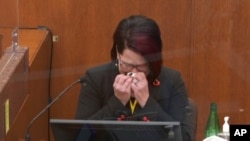George Floyd’s girlfriend tearfully described to jurors Thursday how she first met him less than three years before his deadly arrest in the Midwestern U.S. city of Minneapolis.
Courteney Ross’s testimony came on day four of the trial of Derek Chauvin, the police officer charged in Floyd’s death last year that sparked widespread protests against police brutality and systemic racism.
Ross recalled she met Floyd at a Salvation Army shelter where he worked as a security officer and spoke with “this great Southern voice.” She also acknowledged they both grappled with opioid addiction.
“It’s a classic story of how many people get addicted to opioids. We both suffered from chronic pain. Mine was in my neck and his was in his back,” Ross said.
"We both had prescriptions. But after prescriptions that were filled and we got addicted and tried really hard to break that addiction many times,” Ross added.
Prosecutors appeared to be trying with her testimony to humanize Floyd and promote empathy among the jurors. Chauvin’s defense team is expected to stress that an autopsy found fentanyl and methamphetamine in Floyd’s system.
Late on Wednesday, jurors saw about 20 minutes of police body camera video that spanned the time from when police approached Floyd’s vehicle and when he was loaded into an ambulance.
One video played Wednesday showed Chauvin saying Floyd was “a sizable guy” and “probably on something.”
Chauvin kneeled on the back of Floyd’s neck for 9 minutes and 29 seconds as Floyd cried repeatedly that he could not breathe.
Chauvin, who is white, was fired by the city's police department the day after Floyd, an African American, died in custody.
Jurors also heard testimony from several witnesses, including the convenience store cashier who sold cigarettes to Floyd moments before his deadly encounter with Chauvin.
Christopher Martin testified that he knowingly accepted a fake $20 bill from Floyd for the cigarettes even though the money would be subtracted from his paycheck in accordance with store policy.
The 19-year-old said after second-guessing his decision, he informed the store manager who told him to go outside and ask Floyd to return to the store.
“If I would've just not taken the bill, this could've been avoided,” Martin said.
Echoing sentiments from other onlookers, Martin said he felt “disbelief and guilt,” as he stood on the curb watching Floyd’s arrest.
Martin was among several people who have testified about their frustration and anger as they witnessed Chauvin kneeling on Floyd’s neck outside a convenience store last May.
The officer is facing charges of murder and manslaughter and has pleaded not guilty.
Chauvin’s defense lawyers have argued he was following his training and that other factors such as heart disease and drug use caused Floyd to die.
The city of Minneapolis recently agreed to pay Floyd’s relatives $27 million in damages to settle their claims of abuse in the case.





